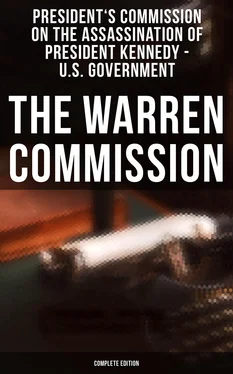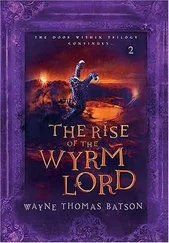And he told me not to ask him any questions. He only told me that he had shot at General Walker.
Of course I didn't sleep all night. I thought that any minute now, the police will come. Of course I wanted to ask him a great deal. But in his state I decided I had best leave him alone—it would be purposeless to question him.
Mr. Rankin. Did he say any more than that about the shooting?
Mrs. Oswald. Of course in the morning I told him that I was worried, and that we can have a lot of trouble, and I asked him, "Where is the rifle? What did you do with it?"
He said, that he had left it somewhere, that he had buried it, it seems to me, somewhere far from that place, because he said dogs could find it by smell.
I don't know—I am not a criminologist.
Mr. Rankin. Did he tell you why he had shot at General Walker?
Mrs. Oswald. I told him that he had no right to kill people in peacetime, he had no right to take their life because not everybody has the same ideas as he has. People cannot be all alike.
He said that this was a very bad man, that he was a fascist, that he was the leader of a fascist organization, and when I said that even though all of that might be true, just the same he had no right to take his life, he said if someone had killed Hitler in time it would have saved many lives. I told him that this is no method to prove your ideas, by means of a rifle.
Mr. Rankin. Did you ask him how long he had been planning to do this?
Mrs. Oswald. Yes. He said he had been planning for two months. Yes—perhaps he had planned to do so even earlier, but according to his conduct I could tell he was planning—he had been planning this for two months or perhaps a little even earlier.
The Chairman. Would you like to take a little recess?
Mrs. Oswald. No, thank you. Better to get it over with.
Mr. Rankin. Did he show you a picture of the Walker house then?
Mrs. Oswald. Yes.
Mr. Rankin. That was after the shooting?
Mrs. Oswald. Yes. He had a book—he had a notebook in which he noted down quite a few details. It was all in English, I didn't read it. But I noticed the photograph. Sometimes he would lock himself in his room and write in the book. I thought that he was writing some other kind of memoirs, as he had written about his life in the Soviet Union.
Mr. Rankin. Did you ever read that book?
Mrs. Oswald. No.
Mr. Rankin. Do you know of anything else he had in it besides this Walker house picture?
Mrs. Oswald. No. Photographs and notes, and I think there was a map in there.
Mr. Rankin. There was a map of the area where the Walker house was?
Mrs. Oswald. It was a map of Dallas, but I don't know where Walker lived. Sometimes evenings he would be busy with this. Perhaps he was calculating something, but I don't know. He had a bus schedule and computed something.
After this had happened, people thought that he had a car, but he had been using a bus.
Mr. Rankin. Did he explain to you about his being able to use a bus just as well as other people could use a car—something of that kind?
Mrs. Oswald. No. Simply as a passenger. He told me that even before that time he had gone also to shoot, but he had returned. I don't know why. Because on the day that he did fire, there was a church across the street and there were many people there, and it was easier to merge in the crowd and not be noticed.
Mr. Rankin. Did you ask him about this note that he had left, what he meant by it?
Mrs. Oswald. Yes—he said he had in mind that if in case he were arrested, I would know what to do.
Mr. Rankin. The note doesn't say anything about Walker, does it?
Mrs. Oswald. No.
Mr. Rankin. Did you ask him if that is what he meant by the note?
Mrs. Oswald. Yes, because as soon as he came home I showed him the note and asked him "What is the meaning of this?"
Mr. Rankin. And that is when he gave you the explanation about the Walker shooting?
Mrs. Oswald. Yes.
I know that on a Sunday he took the rifle, but I don't think he fired on a Sunday. Perhaps this was on Friday. So Sunday he left and took the rifle.
Mr. Rankin. If the Walker shooting was on Wednesday, does that refresh your memory as to the day of the week at all?
Mrs. Oswald. Refresh my memory as to what?
Mr. Rankin. As to the day of the shooting?
Mrs. Oswald. It was in the middle of the week.
Mr. Rankin. Did he give any further explanation of what had happened that evening?
Mrs. Oswald. When he fired, he did not know whether he had hit Walker or not. He didn't take the bus from there. He ran several kilometers and then took the bus. And he turned on the radio and listened, but there were no reports.
The next day he bought a paper and there he read it was only chance that saved Walker's life. If he had not moved, he might have been killed.
Mr. Rankin. Did he comment on that at all?
Mrs. Oswald. He said only that he had taken very good aim, that it was just chance that caused him to miss. He was very sorry that he had not hit him.
I asked him to give me his word that he would not repeat anything like that. I said that this chance shows that he must live and that he should not be shot at again. I told him that I would save the note and that if something like that should be repeated again, I would go to the police and I would have the proof in the form of that note.
He said he would not repeat anything like that again.
By the way, several days after that, the De Mohrenschildts came to us, and as soon as he opened the door he said, "Lee, how is it possible that you missed?"
I looked at Lee. I thought that he had told De Mohrenschildt about it. And Lee looked at me, and he apparently thought that I had told De Mohrenschildt about it. It was kind of dark. But I noticed—it was in the evening, but I noticed that his face changed, that he almost became speechless.
You see, other people knew my husband better than I did. Not always—but in this case.
Mr. Rankin. Was De Mohrenschildt a friend that he told—your husband told him personal things that you knew of?
Mrs. Oswald. He asked Lee not because Lee had told him about it, but I think because he is smart enough man to have been able to guess it. I don't know—he is simply a liberal, simply a man. I don't think that he is being accused justly of being a Communist.
Mr. Rankin. That is De Mohrenschildt that you refer to?
Mrs. Oswald. Yes.
Mr. Rankin. Did you tell the authorities anything about this Walker incident when you learned about it?
Mrs. Oswald. No.
Mr. Rankin. You have told the Secret Service or the FBI people reasons why you didn't. Will you tell us?
Mrs. Oswald. Why I did not tell about it?
First, because it was my husband. As far as I know, according to the local laws here, a wife cannot be a witness against her husband. But, of course, if I had known that Lee intended to repeat something like that, I would have told.
Mr. Rankin. Did he ask you to return the note to him?
Mrs. Oswald. He forgot about it. But apparently after that he thought that what he had written in his book might be proof against him, and he destroyed it.
Mr. Rankin. That is this book that you have just referred to in which he had the Walker house picture?
Mrs. Oswald. There was a notebook, yes, that is the one.
Mr. Rankin. What did you do with the note that he had left for you after you talked about it and said you were going to keep it?
Mrs. Oswald. I had it among my things in a cookbook. But I have two—I don't remember in which.
Mr. Rankin. Did your relations with your husband change after this Walker incident?
Mrs. Oswald. Yes.
Mr. Rankin. Will you describe to us the changes as you observed them?
Mrs. Oswald. Soon after that, Lee lost his job—I don't know for what reason. He was upset by it. And he looked for work for several days. And then I insisted that it would be better for him to go to New Orleans where he had relatives. I insisted on that because I wanted to get him further removed from Dallas and from Walker, because even though he gave me his word, I wanted to have him further away, because a rifle for him was not a very good toy—a toy that was too enticing.
Читать дальше












